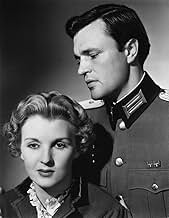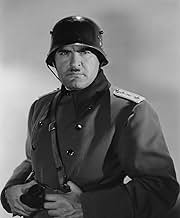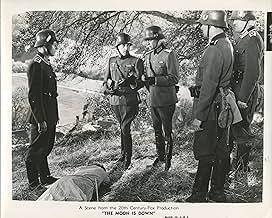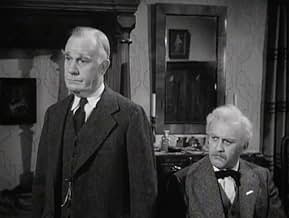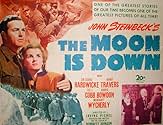During the Nazi occupation of Norway, a small Norwegian village struggles to cope with the invaders and some locals choose collaboration while others prefer armed resistance.During the Nazi occupation of Norway, a small Norwegian village struggles to cope with the invaders and some locals choose collaboration while others prefer armed resistance.During the Nazi occupation of Norway, a small Norwegian village struggles to cope with the invaders and some locals choose collaboration while others prefer armed resistance.
- Director
- Writers
- Stars
- Awards
- 6 wins total
Cedric Hardwicke
- Col. Lanser
- (as Sir Cedric Hardwicke)
Frederic Brunn
- German Soldier
- (as Frederick Brunn)
Ernst Deutsch
- Maj. Hunter
- (as Ernest Dorian)
Ludwig Donath
- Hitler's Voice
- (as Louis Donath)
Richard Abbott
- Villager
- (uncredited)
Louis V. Arco
- Schumann
- (uncredited)
Georgia Backus
- Villager
- (uncredited)
John Banner
- Lt. Prackle
- (uncredited)
Trevor Bardette
- Knute Pierson - Foreman
- (uncredited)
- Director
- Writers
- All cast & crew
- Production, box office & more at IMDbPro
7.0636
1
2
3
4
5
6
7
8
9
10
Featured reviews
Wartime resistance drama...
...based on a novel by John Steinbeck, and directed by Irving Pichel. German forces occupy a small Norwegian village. The coolly pragmatic German leader Col. Lanser (Cedric Hardwicke) tries to set up the occupation with strict efficiency. However, various townsfolk begin to rise up, first in small ways, eventually getting deadlier, leading to misery on both sides. Also featuring Natalie Wood in her debut, but I'll get back to that later.
Having already watched Hangmen Also Die, Hitler's Madman, Commandos Strike at Dawn, and Edge of Darkness, all from 1943, this material is well-worn for me. However, I still managed to enjoy this more dialogue-heavy look at the familiar scenario. Hardwicke is very good as the German officer in charge, more interested in being a quietly effective administrator than a cruel dictator. Henry Travers is excellent as the wise town mayor. Peter van Eyck, who appeared as a German soldier in 6 1943 releases, is moving as a sympathetic soldier. For some reason the filmmakers have 31-year-old Lee J. Cobb playing an old guy in white wig and makeup...there were no actual older actors available? Dorris Bowden, the ostensible female lead, is very uneven as an angry widow. She has some good moments, and others that seem amateurish, but since she was married to producer-screenwriter Nunnally Johnson at the time, she got the part.
Natalie Wood's appearance is a bit problematic. Although uncredited, she's very visible in her one scene, and I thought it was her before I even knew she was supposed to be in the film. Some sources have this listed as Wood's debut while still others say it is not Natalie Wood at all. Regardless, the film is enjoyable, and the ending is very memorable.
Having already watched Hangmen Also Die, Hitler's Madman, Commandos Strike at Dawn, and Edge of Darkness, all from 1943, this material is well-worn for me. However, I still managed to enjoy this more dialogue-heavy look at the familiar scenario. Hardwicke is very good as the German officer in charge, more interested in being a quietly effective administrator than a cruel dictator. Henry Travers is excellent as the wise town mayor. Peter van Eyck, who appeared as a German soldier in 6 1943 releases, is moving as a sympathetic soldier. For some reason the filmmakers have 31-year-old Lee J. Cobb playing an old guy in white wig and makeup...there were no actual older actors available? Dorris Bowden, the ostensible female lead, is very uneven as an angry widow. She has some good moments, and others that seem amateurish, but since she was married to producer-screenwriter Nunnally Johnson at the time, she got the part.
Natalie Wood's appearance is a bit problematic. Although uncredited, she's very visible in her one scene, and I thought it was her before I even knew she was supposed to be in the film. Some sources have this listed as Wood's debut while still others say it is not Natalie Wood at all. Regardless, the film is enjoyable, and the ending is very memorable.
Occupational Hazards
One of the better World War II propaganda films it has stood the test of time far better than a lot in the era. Possibly because the original source was a novel by one of America's best known authors John Steinbeck.
The story is about the Nazi occupation in a small Norwegian town and it is told from the viewpoint of both the conquered and the conquerors. As such in one of the few films of the era, Nazis are presented as three dimensional people and not just merciless Huns. The film also has no box office name stars which in the long run has probably helped with authenticity.
The Nazis invaded and occupied Norway to gain control of its long Atlantic coast line and prevent supplies from getting to the Soviet Union from Archangel and Murmansk. Except in certain circumstances the interior was left alone. This was one of those circumstances.
The town here has an iron mine which is the chief employer. The Reich wanted that mine, wanted the iron ore production stepped up, hence the occupation. Cedric Hardwicke is the commander of the occupying Nazi army and he deals with the occupational hazards of garrisoning a hostile town and making slave labor of its citizens.
Henry Travers is the mayor and Lee J. Cobb the town doctor and the leading two citizens of the town. Hardwicke tries to work with them and Travers especially tries to explain that you folks just aren't wanted. Hardwicke in fact deliberately refuses to remove Travers from office to put the local Quisling E.J. Ballantine in his place. In the end though he falls back on standard Nazi methods.
Ballantine should be singled out. He did not make too many film appearances and The Moon Is Down is his first. But even Hardwicke and his troops can't stand a traitor.
Peter Van Eyck has an interesting role too. The Scandinavians were viewed in the Nazi racial pecking order as fellow Aryans and the bad reception they got when taking over Denmark and Norway was a bit unsettling to their troops. They were told that occupation and the chance to join the Reich would be welcomed. Van Eyck who's a country kid tries to make friends and it unnerves the hate that he's given in return.
This film is a real gem from the World War II years. It should be rediscovered and evaluated as one of the best films of the era.
The story is about the Nazi occupation in a small Norwegian town and it is told from the viewpoint of both the conquered and the conquerors. As such in one of the few films of the era, Nazis are presented as three dimensional people and not just merciless Huns. The film also has no box office name stars which in the long run has probably helped with authenticity.
The Nazis invaded and occupied Norway to gain control of its long Atlantic coast line and prevent supplies from getting to the Soviet Union from Archangel and Murmansk. Except in certain circumstances the interior was left alone. This was one of those circumstances.
The town here has an iron mine which is the chief employer. The Reich wanted that mine, wanted the iron ore production stepped up, hence the occupation. Cedric Hardwicke is the commander of the occupying Nazi army and he deals with the occupational hazards of garrisoning a hostile town and making slave labor of its citizens.
Henry Travers is the mayor and Lee J. Cobb the town doctor and the leading two citizens of the town. Hardwicke tries to work with them and Travers especially tries to explain that you folks just aren't wanted. Hardwicke in fact deliberately refuses to remove Travers from office to put the local Quisling E.J. Ballantine in his place. In the end though he falls back on standard Nazi methods.
Ballantine should be singled out. He did not make too many film appearances and The Moon Is Down is his first. But even Hardwicke and his troops can't stand a traitor.
Peter Van Eyck has an interesting role too. The Scandinavians were viewed in the Nazi racial pecking order as fellow Aryans and the bad reception they got when taking over Denmark and Norway was a bit unsettling to their troops. They were told that occupation and the chance to join the Reich would be welcomed. Van Eyck who's a country kid tries to make friends and it unnerves the hate that he's given in return.
This film is a real gem from the World War II years. It should be rediscovered and evaluated as one of the best films of the era.
Of Flies and Flypaper
This movie is based on one of John Steinbeck's lesser-known novels. I have a feeling that Steinbeck wrote the novel for much the same reason that the movie was made: Propaganda in support of the War.
Nunnally Johnson wrote the play for the movie, based on Steinbeck's novel, just as he had written the screenplay for Steinbeck's The Grapes of Wrath (1940). Nunnaly's wife, Dorris Bodon, had an acting role of both of these movies. The movie's director, Irving Pichel, had a small unaccredited role, here, as the Inn Keeper. Natalie Wood made her first screen appearance in this movie and then went on to make her 2nd, 3rd and 4th movie appearances in Irving Pichel-directed movies: Happy Land (1943), Tomorrow Is Forever, (1943), and The Bride Wore Boots (1946).
This movie is not so much star-oriented as it is character–oriented, with great character actors taking on the main roles. Cedric Hardwick plays Col Lanser, the coy and pragmatic Nazi officer who is assigned to take over a small Norwegian mining village for it rich iron mines. After the German victory, the village historian, Dr. Winter (Lee J. Cobb), acerbically jokes with its mayor, Orden (Henry Travers), that the German victory only took 4 hours and the victory was announced before anyone know there was even a battle.
The "victory" takes place as hundreds of German paratroopers are dropped into the small village while its tiny militia is enjoying a picnic and shooting contest in the country. The picnic had been arranged by the local store keeper, George Corell (E.J. Ballantine), with the hope that he will be quickly advanced up the German ranks and sent to Berlin.
When Col Lanser interviews Dr. Winter, the mayor, and his wife, Sarah (Margaret Wycherly), they are outraged by Corell's treachery. When Lanser tells Orden that the miners must work harder to supply iron for Germany, Odren tells him that Germans do not understand the people they conquer--they never have, and they never will. Free people do not take orders from a dictator, they live to be free and their freedom is build around an idea—not an order from a dictator. Just as Odren says, the people of the village are not easily pushed around. It is easier to conquer a country in battle than it is to occupy it by telling its free people what they MUST do to stay alive.
The movie demonstrates this and it also has scenes that demonstrate that soldiers are trained to fight and win territory–not to manage the people they have vanquished. Not only do the Norwegians slow down their work in the mines, they also commit acts of sabotage on those mines, and engage in other acts of resistance against the Germans who occupy them. This only increases as the RAF drops parachuted packets of dynamite to help them with these many "small" acts of resistance such as blowing up bridges and roads and other means of production and distribution of the mined iron that is to be used by Nazis in their war.
In the end, the German soldiers grow tired of being hated by the locals and guarding against their acts of resistance rather than fighting wars. This is demonstrated when one soldier, Lt. Tonder (Peter van Eyck), tries to just enjoy the simple company of one Norwegian woman, Molly Morden (Dorris Bowdon). Though she is lonely and is very hungry— food is being withheld from the families in order to feed the soldiers and iron miners—she remembers that Tonder was responsible for killing her husband. So, she stabs Tonder to death with a pair of scissors then manages to escape to Sweden.
In the end, "the flies conquer the flypaper."
Nunnally Johnson wrote the play for the movie, based on Steinbeck's novel, just as he had written the screenplay for Steinbeck's The Grapes of Wrath (1940). Nunnaly's wife, Dorris Bodon, had an acting role of both of these movies. The movie's director, Irving Pichel, had a small unaccredited role, here, as the Inn Keeper. Natalie Wood made her first screen appearance in this movie and then went on to make her 2nd, 3rd and 4th movie appearances in Irving Pichel-directed movies: Happy Land (1943), Tomorrow Is Forever, (1943), and The Bride Wore Boots (1946).
This movie is not so much star-oriented as it is character–oriented, with great character actors taking on the main roles. Cedric Hardwick plays Col Lanser, the coy and pragmatic Nazi officer who is assigned to take over a small Norwegian mining village for it rich iron mines. After the German victory, the village historian, Dr. Winter (Lee J. Cobb), acerbically jokes with its mayor, Orden (Henry Travers), that the German victory only took 4 hours and the victory was announced before anyone know there was even a battle.
The "victory" takes place as hundreds of German paratroopers are dropped into the small village while its tiny militia is enjoying a picnic and shooting contest in the country. The picnic had been arranged by the local store keeper, George Corell (E.J. Ballantine), with the hope that he will be quickly advanced up the German ranks and sent to Berlin.
When Col Lanser interviews Dr. Winter, the mayor, and his wife, Sarah (Margaret Wycherly), they are outraged by Corell's treachery. When Lanser tells Orden that the miners must work harder to supply iron for Germany, Odren tells him that Germans do not understand the people they conquer--they never have, and they never will. Free people do not take orders from a dictator, they live to be free and their freedom is build around an idea—not an order from a dictator. Just as Odren says, the people of the village are not easily pushed around. It is easier to conquer a country in battle than it is to occupy it by telling its free people what they MUST do to stay alive.
The movie demonstrates this and it also has scenes that demonstrate that soldiers are trained to fight and win territory–not to manage the people they have vanquished. Not only do the Norwegians slow down their work in the mines, they also commit acts of sabotage on those mines, and engage in other acts of resistance against the Germans who occupy them. This only increases as the RAF drops parachuted packets of dynamite to help them with these many "small" acts of resistance such as blowing up bridges and roads and other means of production and distribution of the mined iron that is to be used by Nazis in their war.
In the end, the German soldiers grow tired of being hated by the locals and guarding against their acts of resistance rather than fighting wars. This is demonstrated when one soldier, Lt. Tonder (Peter van Eyck), tries to just enjoy the simple company of one Norwegian woman, Molly Morden (Dorris Bowdon). Though she is lonely and is very hungry— food is being withheld from the families in order to feed the soldiers and iron miners—she remembers that Tonder was responsible for killing her husband. So, she stabs Tonder to death with a pair of scissors then manages to escape to Sweden.
In the end, "the flies conquer the flypaper."
A rousing WWII propaganda picture.
If you are looking for a realistic portrayal of WWII and the German occupation of Norway, perhaps this isn't the best film ("The Heroes of Telemark" is probably better for that). This is NOT a criticism of "The Moon is Down"...in fact it's a very good film and did its job of inspiring the American people during WWII.
The film is set in Norway just before the German invasion of 1940. The townspeople in a small mining town are all happy and oblivious to the coming stampede. Soon Nazis flood the country and their leader in the town (Cedric Hardwicke) has one goal...total obedience from the people. To do so, they'll kill as many people as they need to in order to keep the iron mine opening and running at capacity. But the locals cannot stand their new German overlords and throughout the film, they work to undermine the occupiers...even at the risk of their lives. This all leads to a VERY rousing finale-- one that still packs a powerful punch today.
This Twentieth Century Fox film is interesting because it shows the Germans as being brutal...but no more so than they actually were in their occupied territories! Instead of focusing too much on this, the movie really centers on the resistance of the Norwegians. An inspiring and well made film based on a story from John Steinbeck of all people. Well worth seeing.
The film is set in Norway just before the German invasion of 1940. The townspeople in a small mining town are all happy and oblivious to the coming stampede. Soon Nazis flood the country and their leader in the town (Cedric Hardwicke) has one goal...total obedience from the people. To do so, they'll kill as many people as they need to in order to keep the iron mine opening and running at capacity. But the locals cannot stand their new German overlords and throughout the film, they work to undermine the occupiers...even at the risk of their lives. This all leads to a VERY rousing finale-- one that still packs a powerful punch today.
This Twentieth Century Fox film is interesting because it shows the Germans as being brutal...but no more so than they actually were in their occupied territories! Instead of focusing too much on this, the movie really centers on the resistance of the Norwegians. An inspiring and well made film based on a story from John Steinbeck of all people. Well worth seeing.
wartime occupation movie
The Germans invade Norway. Mayor Orden (Henry Travers) is a respected leader of the small port town Selvik. Their young men are off to train when an invasion takes them by surprise. They are ambushed by the Germans led by Colonel Lanser (Cedric Hardwicke). George Corell is the traitorous storekeeper and Dr. Albert Winter (Lee J. Cobb) calls him out. Lanser needs the iron mines to continue operating and demands cooperation from Orden's town.
This is adapted from author John Steinbeck's novel. It is solidly made with good actors. It's more of an intellectual work rather than a visceral thriller. There are some long exchanges which dig into the concepts of occupation. It keeps the movie somewhat static and the intensity suppressed. It doesn't shy away from the brutality but it's not an action movie. This is a solid fairly realistic wartime movie rallying the peoples under occupation. As propaganda, it is heroic and hits many of the right notes.
This is adapted from author John Steinbeck's novel. It is solidly made with good actors. It's more of an intellectual work rather than a visceral thriller. There are some long exchanges which dig into the concepts of occupation. It keeps the movie somewhat static and the intensity suppressed. It doesn't shy away from the brutality but it's not an action movie. This is a solid fairly realistic wartime movie rallying the peoples under occupation. As propaganda, it is heroic and hits many of the right notes.
Did you know
- TriviaFilmed on the same sets used for the Welsh mining village in How Green Was My Valley (1941).
- GoofsMost of the German soldiers are wearing WWI-style Stahlhelm helmets, not the WWII version used from 1935 on. Also, paratroopers (Fallschirmjagers) are shown, but none of the German troops are wearing their helmet - without the projecting visor and flared rim.
- Quotes
Lt. Tonder: Last night I dreamed that Hitler was crazy!
- Crazy creditsOpening credits are shown with a hand gesturing to a map of Norway, indicating what is about to take place in the film.
- How long is The Moon Is Down?Powered by Alexa
Details
- Runtime
- 1h 30m(90 min)
- Color
- Aspect ratio
- 1.37 : 1
Contribute to this page
Suggest an edit or add missing content

